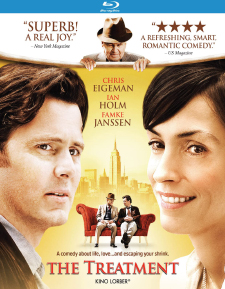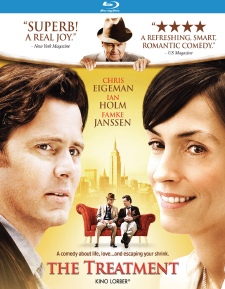Treatment, The (2006) (Blu-ray Review)

Director
Oren RudavskyRelease Date(s)
2006 (May 2, 2023)Studio(s)
Shrinkwrap/Centre Street (Kino Lorber)- Film/Program Grade: B
- Video Grade: A-
- Audio Grade: A
- Extras Grade: C+
Review
The Treatment brings a serio-comic perspective to psychoanalysis in a film centered on a neurotic school teacher whose life is in a perennial rut. It’s also an unusual romantic comedy in that when the teacher stumbles upon romance, his budding relationship is overshadowed by his numerous sessions with an unorthodox therapist.
Jake Singer (Chris Eigeman, Metropolitan) is a thirty-something English teacher and assistant basketball coach at a prestigious prep school in Manhattan. He’s depressed because Julia (Stephanie March, Mr & Mrs. Smith), the latest girlfriend who dumped him, is engaged to be married. He’s unable to maintain romantic relationships, can’t productively communicate with his physician father (Harris Yulin, Training Day), and is disenchanted with teaching privileged, spoiled rich kids. For his emotional health, Jake attends therapy sessions with an elderly psychotherapist from Argentina, Dr. Ernesto Morales (Ian Holm, The Lord of the Rings: The Return of the King), who practices a combative Freudian style of therapy.
Things take a turn when Jake meets Allegra Marshall (Famke Janssen, The Wolverine), an attractive, intelligent, wealthy widow who has inherited her husband’s seat on the school’s board of directors. She and Jake begin a romance. Feeling great for the first time in quite a while, Jake’s upset that Dr. Morales can’t be happy for him. The doctor tries to make Jake realize that he’s only taken the first step toward emotional health and is still holding back.
The Treatment covers territory that Woody Allen has mined for decades, but with less sharp-edged comedy. There are amusing moments as Dr. Morales acts both as Jake’s antagonist and pesky conscience, but The Treatment is far more cynical than empathetically comic. Jake is a good guy who never seems to hit his stride in achieving true happiness. Like many others, he exists rather than lives life fully, hampered by self-doubts, insecurities, and an inability to commit. Allegra offers him an opportunity to change his life for the better, yet he moves forward very slowly.
Apart from Jake’s therapy sessions, Dr. Morales pops up at inappropriate moments like an unwanted coach, urging him to act and baiting him to take action. Only Jake can see him, so these inopportune appearances create confusion and intimidate him from making choices. This leads to awkward situations with Allegra. Holm has some good lines, which he underplays for full comic effect. He’s very quiet at first, listening more than speaking, but as the sessions proceed, he begins to challenge Jake, not accepting his excuses, and even insulting him so that he will become more assertive.
Director and co-writer Oren Rudavsky spends more time with patient and therapist than most similar movies. Rudavsky builds the film around these sessions so we can see the psychoanalytical process in action, albeit through an exaggerated lens.
Eigeman is a good Everyman. Not well known to audiences, he’s easily accepted as Jake, a regular guy who wants more out of life but is hampered by his insecurities. We can identify with both Jake and his internal demons and easily root for him. Eigeman manages to show Jake’s neuroses, wit, charm, and awkwardness with women. His face is extremely expressive and we can read every thought even when he’s not speaking.
Famke Janssen plays rich widow Allegra as sensitive, bright, flirtatious, and passionate. More aggressive than Jake, she projects an air of mystery that draws Jake to her. The screen chemistry between her and Eigeman is very convincing and we can see Jake’s inner turmoil decrease and his tension abate when they’re together. The screenplay features adults acting like adults rather than sitcom versions of grown-ups.
The Treatment was shot by director of photography Andru Parekh on Super 16 color film, printed on 35 mm, and presented in the aspect ratio of 1.78:1. Detail is generally very good, though occasional scenes appear a bit fuzzy. Detail in the leaves of trees, patterns in Jake’s ties, furnishings in Jake’s cluttered apartment, and deep rich wood grain in the Coventry School are especially well delineated. The high definition transfer reflects the natural film grain with minimum distractions. The color palette is natural and skin tones, in particular, are well rendered. Famke Janssen’s complexion is soft and creamy smooth. Deep wrinkles on the face of the headmaster give him an intimidating vibe.
There are two soundtrack options, English 5.1 and 2.0 DTS-HD Master Audio. English SDH subtitles are an available option. Dialogue dominates this film and is clear and distinct throughout. Ian Holm adopts an accent, since he’s playing an Argentinian, though it’s sort of all-purpose and doesn’t sound Hispanic. In outdoor scenes, ambient traffic noise is mixed well with dialogue. John Zorn’s score accompanies romantic scenes but is otherwise restrained.
Bonus materials on the unrated Blu-ray release from Kino Lorber include the following:
- Deleted Scenes (10:49)
- Psychoanalysts Discuss the Film (8:40)
- Theatrical Trailer (2:14)
- International Theatrical Trailer (2:44)
Deleted Scenes – Seven deleted scenes are shown, one after the other: Classroom scene; Mr. Singer with headmaster and colleagues; Jake and Dr. Morales in the park; Jake in bar with Julia and her fiancé; Therapist’s office. Dr. Morales confronts Jake with his lack of involvement; Therapist’s office. A mysterious onlooker; and School hallway. Allegra and Jake pretend not to be romantically involved.
Psychotherapists Discuss the Film – A panel of psychotherapists explain exactly what they do, noting every patient is different. They’re involved in a search for truth. Analysis takes a patient into areas he doesn’t want to go. Boundaries between patient and therapist are discussed. They believe the best approach is to “act human.” A few Freud jokes are exchanged by these professionals.
The Treatment is the tale of a guy who, through psychoanalysis and a recent widow, finds in himself the courage to pursue a real romantic relationship. Therapy is both held up to satire and represented as a serious tool to help an individual resolve emotional issues. The doctor is a broad caricature of a therapist, and the script telegraphs a lot of what will happen, with the final resolution predictable. Direction is on the same level throughout. There are no big scenes or peaks, just mildly dramatic episodes in Jake’s daily life. The driving conflict is within Jake, with person-to-person conflict secondary. The film has charm, its main characters are likable, and the worth of therapy is ultimately shown.
- Dennis Seuling

